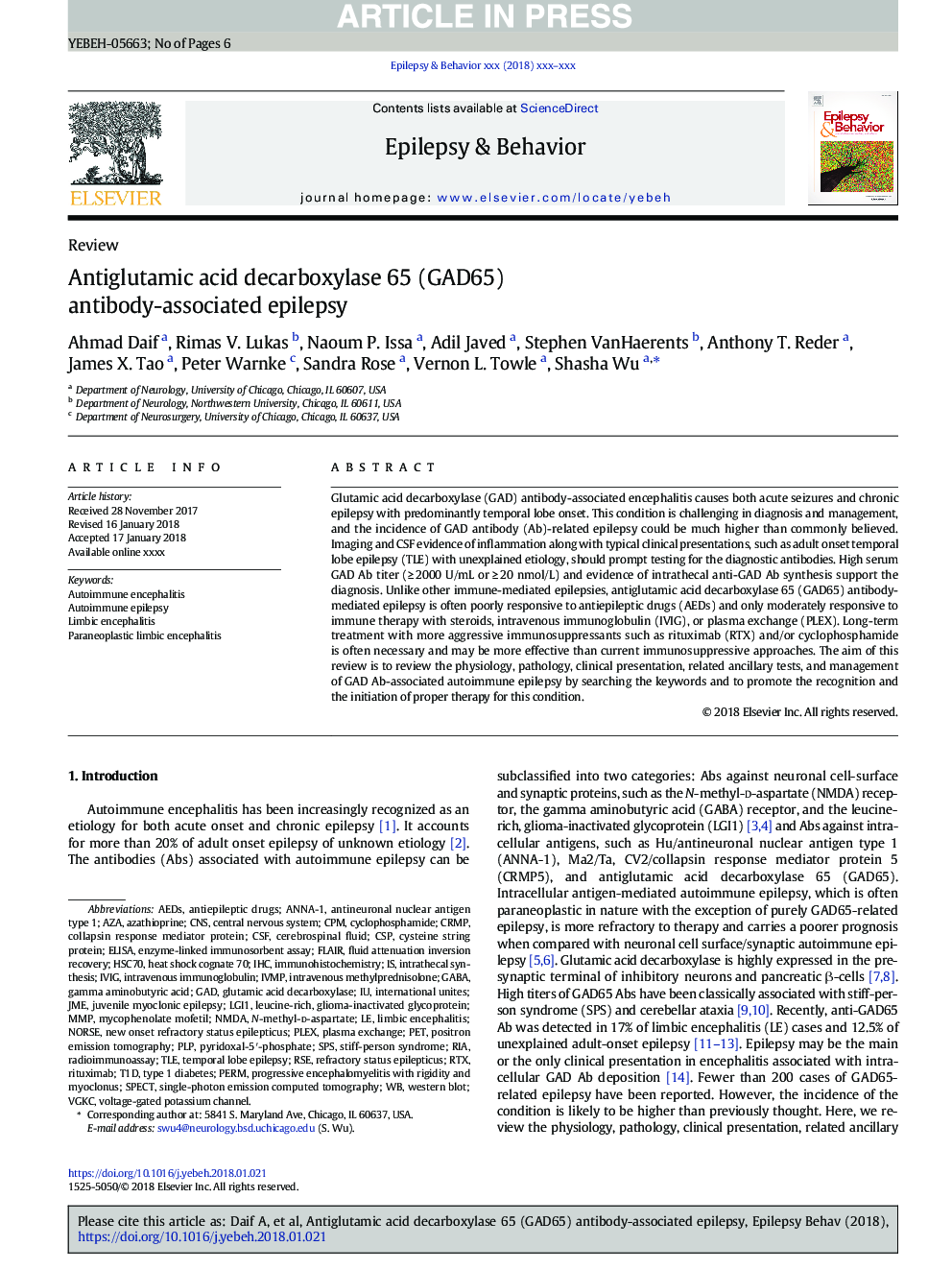| Article ID | Journal | Published Year | Pages | File Type |
|---|---|---|---|---|
| 8683708 | Epilepsy & Behavior | 2018 | 6 Pages |
Abstract
Glutamic acid decarboxylase (GAD) antibody-associated encephalitis causes both acute seizures and chronic epilepsy with predominantly temporal lobe onset. This condition is challenging in diagnosis and management, and the incidence of GAD antibody (Ab)-related epilepsy could be much higher than commonly believed. Imaging and CSF evidence of inflammation along with typical clinical presentations, such as adult onset temporal lobe epilepsy (TLE) with unexplained etiology, should prompt testing for the diagnostic antibodies. High serum GAD Ab titer (â¥Â 2000 U/mL or â¥Â 20 nmol/L) and evidence of intrathecal anti-GAD Ab synthesis support the diagnosis. Unlike other immune-mediated epilepsies, antiglutamic acid decarboxylase 65 (GAD65) antibody-mediated epilepsy is often poorly responsive to antiepileptic drugs (AEDs) and only moderately responsive to immune therapy with steroids, intravenous immunoglobulin (IVIG), or plasma exchange (PLEX). Long-term treatment with more aggressive immunosuppressants such as rituximab (RTX) and/or cyclophosphamide is often necessary and may be more effective than current immunosuppressive approaches. The aim of this review is to review the physiology, pathology, clinical presentation, related ancillary tests, and management of GAD Ab-associated autoimmune epilepsy by searching the keywords and to promote the recognition and the initiation of proper therapy for this condition.
Keywords
JMENMDAN-methyl-d-aspartateRIATLEAEDsLGI1PLPIVIgT1DRTXAZAVGKCCRMPRSEPLEXNORSEIVMPnew onset refractory status epilepticusCPMGADCSPSPSHsc70MMPglutamic acid decarboxylaseazathioprineAutoimmune encephalitisParaneoplastic limbic encephalitisLimbic encephalitisGamma aminobutyric acidFLAIRIHCImmunohistochemistryIntravenous immunoglobulinfluid attenuation inversion recoverySPECTPlasma exchangeEnzyme-linked immunosorbent assayELISAsingle-photon emission computed tomographyPositron emission tomographyantiepileptic drugsCNSType 1 diabetesradioimmunoassayRituximabIntrathecal synthesisStiff-person syndromeRefractory status epilepticuscentral nervous systemCyclophosphamideheat shock cognate 70Autoimmune epilepsytemporal lobe epilepsyJuvenile myoclonic epilepsyCerebrospinal fluidCSFmycophenolate mofetilintravenous methylprednisoloneWestern blotPETCysteine string proteincollapsin response mediator proteinpyridoxal-5′-phosphatepermVoltage-gated potassium channelGABA
Related Topics
Life Sciences
Neuroscience
Behavioral Neuroscience
Authors
Ahmad Daif, Rimas V. Lukas, Naoum P. Issa, Adil Javed, Stephen VanHaerents, Anthony T. Reder, James X. Tao, Peter Warnke, Sandra Rose, Vernon L. Towle, Shasha Wu,
